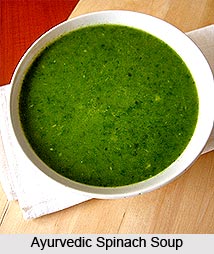 Ayurvedic spinach soup is one of the healthiest diets due to the vegetable being so nutrient-dense. The spinach soup is loaded with vitamin and protein and is immensely beneficial for the growth of body. This soup stimulates pitta and pacifies vata and kapha. Ayurvedic spinach soup is easy to prepare and can be made even at home.
Ayurvedic spinach soup is one of the healthiest diets due to the vegetable being so nutrient-dense. The spinach soup is loaded with vitamin and protein and is immensely beneficial for the growth of body. This soup stimulates pitta and pacifies vata and kapha. Ayurvedic spinach soup is easy to prepare and can be made even at home.
Ingredients of Ayurvedic Spinach Soup:
•One large bunch of spinach that should be four cups when chopped
•Half small green chilli chopped
•Five cups of water
•One and half inch piece of fresh ginger, peeled and finely chopped
•One small handful of fresh cilantro leaves and cumin seeds.
•Two tablespoonful of ghee
•One pinch hing
•One teaspoonful of black mustard seeds
•Four curry leaves
•One-fourth teaspoonful of salt
•One pinch of ground black pepper
Method of Preparing Ayurvedic Spinach Soup:
•Remove the stems from the spinach and wash and chop the leaves.
•Blend the spinach with four cups of water for about two minutes.
•Blend half cup of water, chilli, ginger, and cilantro and prepare a liquid paste.
•Put the soup pot on medium flame and then add ghee, cumin seeds, hing, mustard seeds and curry leaves.
•Cook until the seeds pop out.
•Pour the blended spices and spinach.
•Add salt and the last cup of water and stir well.
•Boil it for nearly fifteen minutes without covering it.
•Season it with black pepper while serving.
Benefits of Ayurvedic Spinach Soup:
•Spinach is astringent, sour, which stimulates pitta and pacifies vata and kapha.
•It is good for people suffering from asthma, as decongestant and also helps developing immunity.
•It is good for eyes.
•It improves one`s memory power and enhances the capacity to learn more.
•Spinach is low in calories and fat content hence it can be helpful in reducing weight.
•Spinach contains rich amounts of iron so this soup is capable of increasing the energy level.
•This soup can improve one`s brain functioning level as spinach contains rich amounts of beneficial antioxidants such as vitamin E.
Caution about Ayurvedic Spinach Soup:
Ayurvedic spinach soup should be avoided if one has gall bladder stones, kidney stones, gouty arthritis and edema.




















